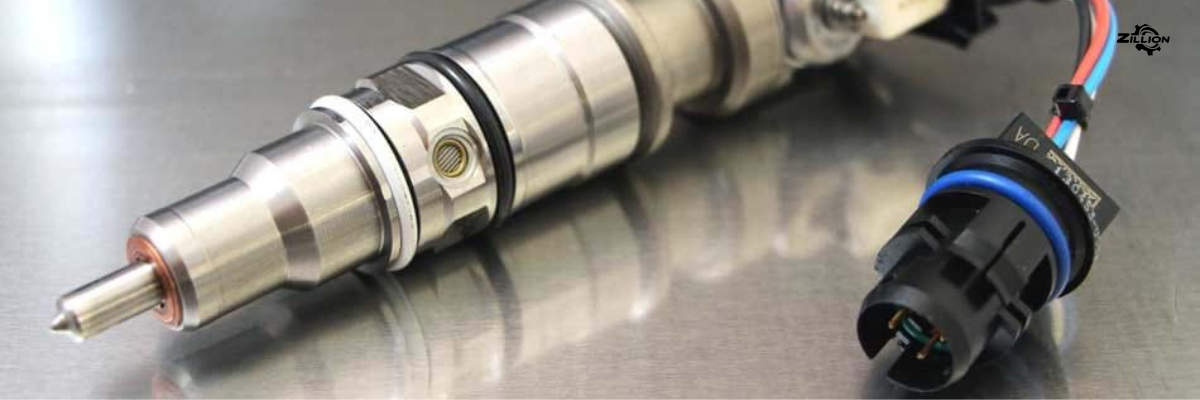Fuel nozzles play a critical role in the efficient functioning of internal combustion engines. However, just like any component in a mechanical system, fuel nozzles are prone to a range of issues which can negatively affect performance, efficiency, and even lead to engine damage if left unaddressed.
Heavy-duty parts technicians selling replacement fuel system parts to fleets, repair shops, and owner-operators should have a general understanding of how the fuel system works and what the common symptoms, problems, and solutions are so that they can help repair technicians order the correct parts the first time.
In this article we will cover the following:
- Symptoms of Fuel Nozzle Issues
- Common Fuel Nozzle Problems and Solutions
- Problem: Clogged Fuel Nozzles
- Solution: Filtering Out Contaminants
- Problem: Water in the Fuel
- Solution: Proper Fuel Storage
- Problem: Incorrect Fuel Atomization
- Solution: Fuel Additives
- Training for Parts Technician

Symptoms of Fuel Nozzle Issues
Fuel nozzle issues can cause a wide range of symptoms including the following:
- Reduced engine performance
- Poor fuel efficiency
- Rough idling or stalling
- Excessive exhaust (smoke)
- Engine misfires
- Engine surging
- Check engine light
If your customers are experiencing any of these symptoms, it could be a fuel nozzle issue and they should immediately have the issue diagnosed by a qualified technician to figure out the underlying cause and address it. Once the fuel system has been identified as the problem, the repair technician will look at several components of the fuel system including the fuel nozzle.
Common Fuel Nozzle Problems and Solutions
Here are three of the most common things a repair technician will look at when diagnosing a fuel system issue where they suspect the fuel nozzle is the problem.
Problem: Clogged Fuel Nozzles
Modern diesel engines with common rail fuel injection systems primarily use injectors with multi-hole nozzles. These common rail applications operate at incredibly high pressures, reaching up to 30,000 PSI. To reach these high pressures the fuel nozzles are manufactured to tight tolerances. Some as small as 2 microns of rotational tolerance. Fuel with tiny bits of dirt, algae, or other contaminants can cause problems.
Solution: Filtering Out Contaminants
The first line of defense is the fuel filter. Make sure you recommend a high-quality fuel filter. These filters play an important role in removing contaminants from the fuel which is why you should only recommend filters that meet OEM specifications.
Problem: Water in the Fuel
Water in diesel fuel is another major problem. Diesel fuel is the only lubrication in the fuel system and if too much water gets into the fuel system it raises the boiling point of the fuel which leads to blown nozzle tips.
Solution: Proper Fuel Storage
Many commercial fleets store their own diesel fuel in above ground fuel tanks. If there are drastic changes in temperature, for example between day and night, condensation will form on the inside of the tank above the fuel line and will run down the inside of the tank mixing with the fuel. Keeping these tanks full will reduce the issue but replumbing your storage tanks is the recommended solution for above ground gravity fed systems.
Problem: Incorrect Fuel Atomization
When the fuel nozzle fails and breaks down fuel into fine droplets, it leads to uneven fuel distribution in the combustion chamber resulting in incomplete combustion, reduced power output, and increased emissions.
Factors like nozzle wear, clogging, or misalignment contribute to this issue. Some areas of the combustion chamber receive too much fuel while others get too little, causing an imbalance in the air-fuel mixture. This inefficient mixture leads to reduced engine performance and potential damage over time.
Solution: Fuel Additives
To prevent incorrect fuel atomization, regular maintenance and inspection of fuel nozzles are crucial, ensuring proper atomization and optimizing engine operation while minimizing emissions. Using fuel additives designed to clean and lubricate the fuel system can help prevent deposits from forming and improve fuel atomization, leading to better combustion efficiency.
Also, the Cetane rating measures diesel fuel quality and how well it burns, like gasoline's Octane rating. In North America, diesel must have a minimum rating of 40, while in Europe, it's 51. Adding additives can improve fuel quality and lubrication, but avoid those with alcohol, as they can harm lubrication and cause pump or injector issues. So, while additives can help, choose wisely to keep your engine running smoothly.
Training for Parts Technicians
Well-trained parts technicians can quickly recognize symptoms, and help repair technicians to diagnose issues, and fix them to prevent further fuel related issues. Following manufacturer specifications optimizes combustion efficiency and fuel delivery. Proper alignments ensure even fuel distribution in the combustion chamber, boosting engine performance and reducing emissions.
Parts technicians require ongoing training which does come at an upfront cost to the parts distributor but quickly creates a return on investment because it empowers parts technicians to help fleet, repair shops, and owner-operators to identify the correct parts the first time and avoid thousands of dollars in downtime that occurs when you only address the symptoms instead of the root cause.
On the other hand, not training your parts people will save you the upfront costs but comes with a heavy price that is invisible to many people. To learn more about the invisible cost of not training your heavy-duty parts people listen to episode 303 of The Heavy Duty Parts Report.

Get Access to Training from Zillion
Zillion Heavy Duty Parts sells fuel injectors and pumps, aftertreatment, and other engine components and provides our distributors with training and resources on all the parts we sell.
Visit ZillionHD.com for more information about these parts. Apply to be a distributor here and join us in revolutionizing the trucking industry and creating a future where liberty knows no bounds.





